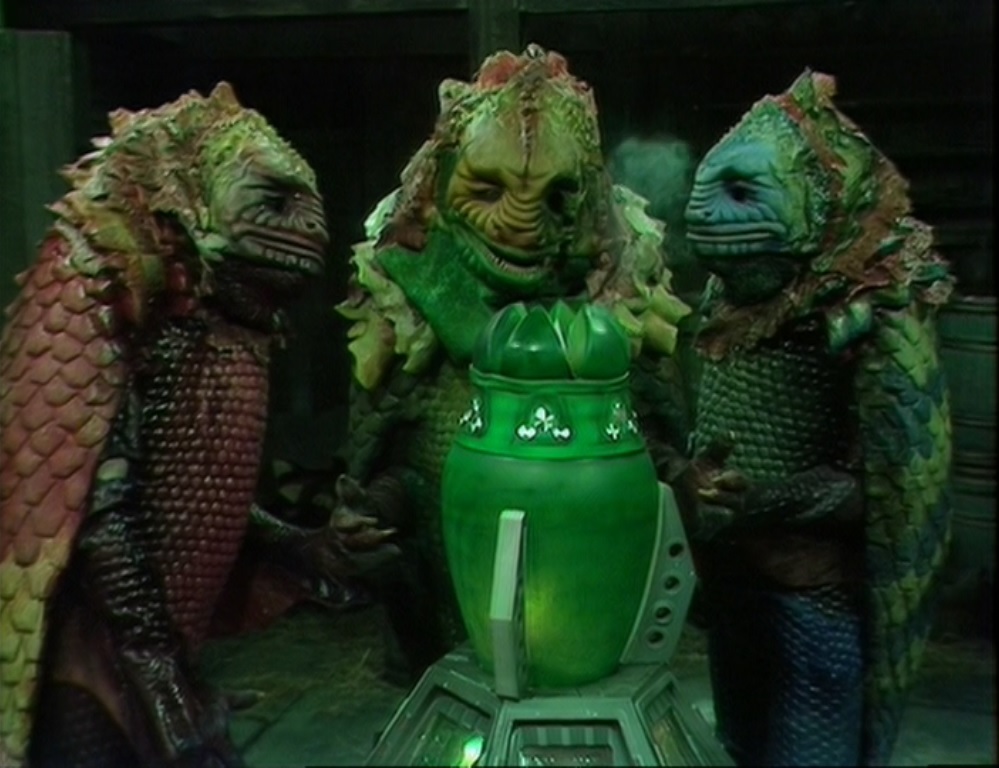Doctor Who‘s first ‘blockbuster’ script editor Eric Saward helped the programme to reach new heights in the 1980s.
Doctor Who was going through a period of radical change in the 80s, in large part due to the appointment of a new producer in the shape of John Nathan-Turner, who was keen to root the series in real science and gritty stories. These elements had certainly been present in his first season as producer (which was also Tom Baker’s last) but when Peter Davison took over the TARDIS in 1981, it was clear that more changes were on the horizon.
The reason for this was that the show’s then script editor Christopher H. Bidmead was ready to leave, and Eric Saward, as it transpired, would be the man to replace him. Eric Saward had already written for the show during Peter Davison’s first series, penning the fondly-remembered ‘The Visitation’ which introduced the Terileptils, and he seemed a solid choice for the passing of the proverbial baton.
Interestingly, ‘The Visitation’ is very different from any of the other Doctor Who stories Eric Saward went on to write as, by the author’s own admission, it was more in the traditional style of 70s Doctor Who and perhaps more akin to a Jon Pertwee adventure than the cinematic, body-filled epics that would follow. But it was well received at the time, and indeed the viewing figures increased as the story went on, with 9.1 million tuning in for its opening part and 10.1 for its finale.

(C) BBC Studios
It was during this time that Eric Saward began to more fully understand the the direction the programme was heading in, and he was awakened to new possibilities. As such, his next adventure ‘Earthshock’ (which he had to commission himself to write, as there were no other suitable writers) was entirely different in style and tone, and in fact one could be fooled into thinking it had been penned by a different author – all the more surprising given that it was broadcast only a few weeks after ‘The Visitation.’
Arguably, there had never been a story like ‘Earthshock’ in terms of its pacing and tone. It is a fast-paced, action-packed space epic, and feels more like a movie than a teatime sci-fi adventure. There is also a bleakness to it, and no happy ending; the Cybermen‘s plan does actually succeed (after a fashion) and the Doctor’s companion Adric is killed. Even the Doctor is shown to be acting in an uncharacteristically aggressive manner, gunning down a screaming Cyberman at point-blank range.
The reason for this shift in style was, as Eric Saward said in a subsequent interview for the BBC DVD range, a desire to “release the handbrake on violence” – the rationale being that these were outer space adventures where the Doctor was being constantly threatened. Eric Saward believed that, if violence was going to be shown, “it should be shown to be real.”
And indeed there was an honesty and a realism to the presentation of Eric Saward’s adventures. The debate, of course, is what to depict, and in how much detail. ‘Earthshock,’ for example, showed the remains of melted human bodies, pulverised by the Cybermen’s faceless black drones – and some have argued that this was too much.
Conversely, the level of violence seemed to have little impact on the viewing figures, which hovered around the 9 million mark throughout ‘Earthshock’s run.
Then there was the spiritual sequel to ‘Earthshock’ – the 1984 epic ‘Resurrection of the Daleks’ which, in the years since its broadcast, Eric Saward has openly criticised, blaming himself for delivering scripts which he felt were under par and did the Daleks a disservice. But, like ‘Earthshock,’ it is pacey and action-packed and bleak in tone. Moreover, it features one of the highest body counts of any Doctor Who story – although given that it is a tale about fascistic creatures whose sole desire is to exterminate all who are different from them, this is understandable, and it fits Saward’s earlier goal of showing violence “to be real.”

(C) BBC Studios
Nonetheless, Eric Saward was keen to have another go at a Dalek story, and returned the following year with ‘Revelation of the Daleks’ starring Colin Baker. Interestingly, this adventure was inspired by an obscure novel called ‘The Loved One’ about a funeral parlour in Los Angeles, and it’s certainly more of a character-driven piece. In addition, Eric Saward had been working closely with one of Doctor Who‘s former script editors Robert Holmes, and there are certainly some ‘Holmesian’ hallmarks in evidence in this tale, such as the mild satire and Holmes’ penchant for double acts, with Saward creating such memorable partnerships as Orcini and Bostock, and Kara and Vogel.
Certainly, ‘Revelation of the Daleks’ proceeds at a gentler pace to its predecessors, perhaps because of the new format of Doctor Who in 1985 (the show started serving up 45 minute episodes, as opposed to the traditional 25.) That being said, the level of violence is perhaps at its highest; in one scene, a particularly embittered character called Tasembeker stabs her boss Jobel with a hypodermic needle. And then, of course, there is the moment where Davros has his hand blown off.
Sadly, ‘Revelation of the Daleks’ proved to be the last full story Eric Saward contributed to Doctor Who, and the reasons for this are complex – one being that the BBC suspended the show in 1985. Eric Saward did stay in post, however, and helped to devise the 1986 season ‘The Trial of a Time Lord,’ but departed after he and John Nathan-Turner failed to agree on an ending. Saward subsequently withdrew his script for episode 14 and refused to let the production team use it.
But undoubtedly, it is no exaggeration to say that Eric Saward overhauled the pace and style of Doctor Who in the 1980s. He demonstrated what could be done with an impossibly small budget; it didn’t matter if “all the corridors looked the same” in ‘Vengeance on Varos,’ because the script was strong. Indeed, the story’s author Philip Martin cited Eric Saward’s advice as being crucial to his writing, with Saward telling Martin to “create a whole world” rather than just a story, focusing on its characters and its politics and its society.
In short, Saward brought a pace and tone that elevated Doctor Who‘s popularity in the 80s and firmly cemented it in a new era of television. Would Doctor Who have survived without him? Probably, but it might not have been as good.
Which is your favourite Eric Saward story? And how much violence is too much when it comes to Doctor Who? Let us know in the comments below.








While delving into the fascinating world of Doctor Who, have you ever wondered: ‘If given the opportunity to rewrite a Doctor Who story, which missing episode would you choose to bring back to life, and why would this particular story be a game-changer for the series? Share your thoughts at our forum, and don’t forget to explore the latest Doctor Who merchandise at Lovarzi shop! ()